After watching the 15 minute video-summary of our two-hour conversation with Dr. Danny Penman, we invite you to dive below into the full transcript of our chat. Enjoy!
Florian DAVID: Free Thinking since 1961 – that’s Arnolfini’s motto, we are here today at Arnolfini in Bristol. One of the leading cultural centres, if not the leading cultural centre in the city. We are very proud and honored and grateful to be there for the premiere of our show untited “Whole Life” – a show about what makes a happy life, a healthy life, a creative life, a fulfilling and meaningful life. We are very happy and honored too to receive today an expert in mindfulness, doctor, author, award-winner Danny Penman.
Danny Penman is a qualified meditation teacher, and award-winning writer and journalist. He’s been writing features for the Daily Mail, for The Independent as well as previously worked with the BBC, The New Scientist, and he is the co-author with renowned psychiatrist in Britain Dr. Mark Williams, of a fantastic book, a best-seller book untitled ‘Mindfulness: A Practical Guide to Finding Peace in A Frantic World”. This book has been translated in 25 languages and is the best-selling book on mindfulness in America. Danny Penman, welcome!
Danny PENMAN: Thank you.
DAVID: Let’s start with the most important question. What is mindfulness?
PENMAN: Mindfulness is…Really it’s paying full conscious attention to whatever is going on in your mind or what’s going on around you, or what you are feeling, physically and mentally in the present moment. Traditionally it was cultivated through mindfulness meditation. Very simple ones include just focusing on the breath, focusing on the sensations that breath makes, as it flows in and out of your body. But it also is a lot broader than that. It includes just paying full attention to whatever your are doing so if you’re eating, you know, you are tasting all of the different tastes in the food, rather than focusing on whatever is going through your mind at that time. It’s smelling the aromas of the food, for example, if you’re walking down the street, it’s feeling the air flowing over your skin, through your hair, feeling how your feet touch the floor as you’re walking down the street. It’s really being in contact with the real world rather than living inside your head.
DAVID: We’ll come back to that in a moment, because we are obviously all interested in the tips that Daniel can offer us to live as more happier humans.
So let’s talk a little bit about you. Where were you born?
PENMAN: I was born in a place, probably no one has ever heard of, just outside of Liverpool, it’s called the Wirral, essentially it’s a peninsula between Wales and Liverpool. It’s a huge sand bank between two rivers basically. It’s about 30 km long, 15km wide. It’s a great little place. It’s kinda half a very urban extension of Liverpool and half an extremely rural area. Beautiful little villages. So it’s a great place to grow up.
DAVID: What kind of family environment?
PENMAN: I had a delightfully crazy upbringing. My parents were really into animals, so we had so many animals, you wouldn’t even believe! We had horses, we had goats, lots of cats and dogs, geese, rabbits, you name it…My family gained a reputation for always taking in sick or injured animals so they were constantly coming in! Half of my family were also into motorbikes, so I learned to ride a motorbike when I was 5 or 6 year old. Yeah it was just a completely chaotic, wonderful upbringing.
DAVID: I forgot to mention in the introduction that Danny is a huge animal lover and he has been awarded a few journalistic prizes for investigative reportages about the way animals are treated?
PENMAN: Yeah, when I was a journalist, I mean you’re always a journalist, you can’t give it up, that’s what I focused on: animal welfare, animal rights really… And the environment. And it was only later that I started doing more scientific stuff. But my heart and soul, in journalistic terms, has always been in animal welfare.
DAVID: Let’s jump straight to another question here: you’ve been to China, but in the UK too some animals are really badly treated; why do you think humans are able to inflict such pain to the animal kingdom?
PENMAN: There’s loads of reasons…It’s not just one reason. One is profit. They’re treated as commodities. And you know, the same way a bag of coconuts or cement, or iron, wouldn’t be treated well, they are just viewed in the same light. And that’s the fundamental problem – they’re not treated or regarded as thinking, feeling creatures. They’re not regarded as sentient creatures and that’s the core problem.
DAVID: We’re basically placing ourselves humans at the top of the pyramid, like we’re better than everything else on earth right? What kind of values where imbued into you while growing up, with your family… What do you remember?
PENMAN: Great respect for the environment, for animals, for other people as well. The idea that you can go out and do things. You know, that you shouldn’t really be held back by other people or society in general…You know, if you just follow your heart – heart wins really. And I just think it’s a great way to be brought up. Not constrained by society. You know, virtually everybody will try and hold you back in some way. They might do it consciously or they might do it unconsciously.
DAVID: That’s how we lose the sense of playfulness that we have as kids. Do you remember about that? Do you remember being a playful kid and do you feel having lost that sense of playfulness to some extent?
PENMAN: Yeah…For sure…. Although, I am not sure how playful I was, because I was always fascinated by…I suppose I was intellectually playful, I’ve always had this driving curiousity, but playfulness is essential to a happy life I think.
DAVID: If you took a look at Danny, your 12 year old self, and Danny today, have you ever given thought to what has fundamentally changed in your personality?
PENMAN: Yeah, I mean, you become, as you grow up, more concerned with the rest of the world, I suppose. I am sure that a psychologist or a psychiatrist would point out to he fact that there are many different stages of, you know, of your life, and you kind of start off with that intense playfulness and curiosity and then I suppose when you get to you mid or late twenties you become very conscious about how screwed up the world is. And then after a certain point you think “oh well, there’s not much I can do, I’ll just get on with the bits that I can do”!
DAVID: How old were you when you started thinking “there’s not much I can do”?
PENMAN: No I would never say, “there’s not much I can do’, I’d say there’s a limit to what I can do, there’s just…
DAVID: So much you can do…
PENMAN: There’s only so much you can do. And I just think everytime you see an opportunity to improve things you just grab it and do your best. And the rest of the time enjoy life [laughs]!
DAVID: You are a great writer. Has writing always been on your radar screen? For what I gathered you started journalism covering the war in Yugoslavia. What did you learn from this conflict? I mean, from this experience, from being there on the ground?
PENMAN: I learned that I didn’t want to become a war correspondent [laughs]! It was funny, I started off full of the romance of journalism – you go to these war- toned parts of the world and you bring back these brilliant, important stories. And you tell your own country what’s going on, but I realized that war was such a mess, it was so chaotic, so crazy and ultimately so pointless, that there’s actually no point in doing that. I’ve got great respect for foreign correspondents and war reporters, but, I think, fundamentally, that it is a bit pointless.
DAVID: Did you learn anything about human nature, seeing what was happening there firsthand?
PENMAN: Yeah, how scary normal people can be. I really have a vivid memory of a refugee camp. I was in eastern Croatia. And it was mostly women, men and young boys who were fighting. And I was interviewing this family and I was speaking to a girl, I think she was 15, and she was absolutely delightful on every level, and I just said “what are going to do, what do you want to do with you life?” and she just said that she wanted lots of sons who could fight and liberate her country. And I just thought that’s really scary that she was willing to have children to basically just send them to war.
DAVID: Indeed…
PENMAN: That really shocked me, because… oh well…
DAVID: Because it is contrary to how we tend to think about life…
PENMAN: Yeah, exactly!
DAVID: Would you say that you are an idealist?
PENMAN: Yeah. I think I am. Not as idealistic as I was. I mean, I have my ideals…
DAVID: Which are…?
PENMAN: Where do you begin… I mean, if you could pin it down: some vegan, green utopia. Which is a 500 year project, you know. People are not gonna give up eating meat within the next few hundred years. There’s lots of environmental problems but they are getting sorted out, but again it’s gonna take at least a hundred year before those problems start getting reversed. I mean, they are being reversed in Europe but this is just starting in other parts of the world. But, you know, people fundamentaly are intelligent, I think. Or at least societies become intelligent, maybe individuals aren’t. And I just think these problems will be sorted out.
DAVID: I’d like to believe you.
PENMAN: Well in a sense, what’s the alternative?
DAVID: Absolutely. We have to be optimistic.
PENMAN: Yeah, you know, people will behave with extreme stupidity until they are forced to wake up and do something about a problem.
DAVID: We had an interesting conversation a few weeks back with Ori Kafri who is a famous hotelier in Italy, and he said something that struck me because I’ve often heard the contrary, he said: “you can never really be too kind.” Can you? Can we?
PENMAN: Depends on what timescale. You can’t be too kind on the long run, sometimes people have to be shocked to change their behaviours. I’m just trying to think of a good example… Short term kindness would be if somebody is massively overweight and they are eating loads and loads of junk food. So to be kind to them I’d give them some junk food – which is kind in the short term. But on the long run, you know, they have got to be encouraged to get themselves off the junk food and start living a healthy life. So what seems kind in the short term, is actually bad for them in the long run… and vice versa. So maybe it’s a way of saying that you can’t be too kind…
DAVID: To put the question differently: in today’s business world, can we be kind and still get it our way and succeed? Can we be kind and successful and tough at the same time?
PENMAN: Well, of course you can be kind and successful. You know, in the present incarnation of capitalism we are encouraged to just compete without realizing that actually, you know… A business operates in an eco system and if it starts ripping off its customers, and even try to destroy its competition, ultimately, everybody will be a loser! Including the businessman who thinks he’s being clever by being ruthless.
DAVID: It seems to me there are a lot of losers running free right now [laughs]!
PENMAN: In a sense you are a loser only if you don’t learn from your mistakes.
DAVID: This mindset is still extremely prevalent that successful people, successful entrepreneurs - and you see it with the Donald Trump’s campaign - have got to act ruthlessly. You know this idea that I have heard all along growing up, and through business school, this idea that you have to be a killer, which is the worst idea I’ve ever heard in my life. There still seems to be this preconception that you can’t be kind and a very ‘aggressive’, commercially astute business man.
PENMAN: Yeah, but that’s the narrative. That’s the narrative we are being fed. I don’t believe it. Because what I think is happening is that you have a whole body of people who are successful and the media are focusing on the ones who are nasty, and ruthless, and selfish, and saying: “that’s what you need to be to succeed!”, but for every business leader who is being completely psychotic, you’ll find another two, three, or ten maybe who are actually fairly decent persons. He or she might make tough decisions from time to time, but they’re not completely crazy. They’re just getting on with their lives. And the media especially, because it fits the prevailing narrative, likes to focus on the completely psychotic ones, because it makes good stories, doesn’t it? And we think, we then extrapolate to say: “if I want to be successful, I’ve got to be thoroughly nasty and objectionable.” And actually, I don’t think that you need to be. You know, you become successful by doing something well.
DAVID: What drives you today?
PENMAN: Today, I like talking to interesting people and then you know I think that mindfulness is incredibly important. I think it’s one of the keys to the next stage of social evolution, I suppose. I think that, the western system is coming to its end, it’s coming to the end of the cycle, and I think that the new cycle is going to start very soon. It may be tomorrow, it may have already started 5 or 10 years ago, but I think that there’s going to be a massive change over the next decade and mindfulness is going to be one of the driving forces behind it.
DAVID: The cost of brain disorders to the UK, estimated at…Are your ready? At a hundred and twelve billion pounds a year. The figure includes direct medical costs as well as indirect costs such as loss of productivity due to absence from work, or early retirement. And it’s research from Imperial College, so they’ve got the data to back it. That is staggering, isn’t it?
PENMAN: Absolutely! But that also does not include the loss of ideas that have never been put into practice.
DAVID: And the loss of happiness…
PENMAN: Absolutely, the loss of happiness…And that’s immeasurable, there’s no way you can measure that.
DAVID: Is mental health the first problem that we are facing today in our occidental world?
PENMAN: Yeah, I think so… I mean, it’s not mental health in the sense that people are breaking down and having complete psychological collapse. It’s people just wandering around not very happy, a bit anxious and stressed and depressed. They may never go near a doctor, but they are not functioning at their optimum level. And that’s the real tragedy, that’s the real cost, I think.
DAVID: I liked the sub-title of your latest book ‘Mindfulness For Creativity’. There are three important verbs there: you say: “Adapt, Create, and Thrive in a frantic world”. Let’s start with the end – the frantic world. I like this word ‘frantic’ because I checked it out, it’s an interesting adjective: it’s an archaic form for mentally deranged, but it also mean emotionally out of control. Another definition is: marked by fast and nervous, disordered or anxiety-driven activity. It’s a very complex and rich word. The world is frantic indeed!
PENMAN: Exactly, I have this vision of a person, a hamster as it were, just like trapped in this wheel and constantly trying to get ahead…And always failing…
And I think that summarizes the life of people in this country, across the whole world really. This frantic struggle to get ahead…And, you know, on one level, it’s entirely understandable. Everybody wants to get ahead, everybody wants to get the best life they can have. But that continuous striving can get out of control.
DAVID: We’ll come back to it, because it’s a lot about control. Mindfulness as a stepping stone towards a change in your life, to regain control in your life is that a fair thing to say?
PENMAN: I wouldn’t say it’s a way of regaining control of your life, it’s a way of coming to an acceptance of your life. Because regaining control over your life on one level implies that you’re still strapped in that system, that process. And actually, if you just step outside of this process, it you no longer try to regain control, but you are just accepting yourself for what you are, I think that’s far more powerful in the long run!
DAVID: Danny, were you living a frantic life prior to discovering mindfulness?
PENMAN: Yes. A delightfully frantic life, I was doing great journalism, I was having a great life. I mean, I was fully enjoying life, but I was pretty much on that treadmill in some ways. But what brought me to mindfulness was a really bad paragliding accident. I was flying somewhere in southern England and my canopy collapsed. I was about, I think initially I was about eighty feet up off the ground, so it completely imploded. I managed to regain control of it, but I’d fallen down about thirty feet up off the ground. And it collapsed again, and this time I just went straight into the hill-side. And, luckily, I landed on my feet, but unluckily, the lower half of my right leg had been driven a couple of inches through the knee and into my thigh… So it was really a horrific injury.
DAVID: When was that?
PENMAN: That was ten years ago, 2006. Yeah, I mean, the knee joint was completely shattered, my shin was broken in about 6 places, I think, so I was in a real mess.
DAVID: Were you alone?
PENMAN: No, there were other people flying, but yeah they had to land to help me. I was kind of lying on this hill-side, in unbelievable pain, I mean, it was absolutely horrific. Obviously I had no painkillers with me. So I did a meditation, I actually had learned in secondary school, when I was about 16 or 17. And we had been taught this, it was part of the stress relief program. And I had used it off and on whenever I found that life was getting a bit stressful, you know, during the exams for example or other times. I then remembered this, because I had also heard that meditation was good for pain relief and I was pretty desperate, so I gave it a try. It’s a very simple breathing meditation, where I was kind of focused on the breath, and just kind of regaining control on myself again. And to my surprise it worked really well. I mean, the pain was still there, but it was separate from me, so I was able to cope with it. And I went to the hospital, I spent a month or so there. They had to re-build my leg and I had this big steel frame holding my leg together. There were like three of four concentric rings around the outside of my leg and sixteen bars and wires going in one side of the leg and out on the other, to hold everything in place.
DAVID: that did not look too good, right?
PENMAN: Yeah, it was horrific! I mean they gave me chemical pain relief as it were… But that leaves you kind of jaded and washed out and it takes all the fun out of life in a sense. So I used this meditation again to help me with the pain. And I managed to reduce the amount of painkillers that I was taking by two thirds. I found it was really good for the kind of stress and anxiety and general unhappiness that I was feeling then. You know, this was quite a life changing event on many levels.
DAVID: Did that unhappiness pre-exist prior to the accident?
PENMAN: No no, it’s just, I was lying there, then I couldn’t walk I had to use clutches. There was still a chance that they’d have to remove my leg, for example, because the injury was so bad, I was doing three hours of physiotherapy a day, I could only sleep for 20 minutes at a time. What would happen is that at night my leg would go into spasms…So I was…These were pretty horrible times! That’s where the unhappiness came from. And I think that what mindfulness gave me was a sense of perspective.
DAVID: Distanciation?
PENMAN: Yeah, well, mostly perspective in that… Yeah, it was a horrible time at that moment, but it was just one event in hopefully a long life. And that I would get through it… And I’d make as good a recovery as it was possible to make. That deep seeded sense of perspective, that’s what mindfulness gives people. That’s why it’s so powerful against anxiety, and stress, and depression, as it just broadens your horizons: life may be pretty crappy at the moment but it was not always the case and it won’t always be.
DAVID: Did you communicate with the medical staff about what you were actually doing yourself to reduce the level of medication?
PENMAN: Yeah, the surgeon was brilliant! He said: “whatever you want to try, just do it!” He said, it’s not gonna do you any harm and it might just help. And you know, I had tried lots of other therapies: I’d really changed my diet quite substantially as well, because I wanted to give my body the best opportunity to repair itself. So throughout that time I became a vegan, because dairy products aren’t very good for your bones – which is kind of counter-intuitive, but it’s true. Lots of really acidic foods like tomatoes and oranges because they promote bone growth. I just had a lot of time on my hands so I was researching all this!
DAVID: How long did you stay hospitalized? Until you could walk again?
PENMAN: Well, I was in hospital for a month, which is a long time for the NHS, they like to get you out the door as fast as possible. And then I had this frame on my leg for, I think it was five months, something like that. But the surgeon originally thought I’d have the frame on my leg for eighteen months. So that’s an indicator of how rapid the healing process was compared to what was expected.
DAVID: You attribute that to the practice of mindfulness?
PENMAN: Yes… I joked about this with the surgeon because I wrote this story for my newspaper, and he said: “to be honest, I’ve done a hundred of these operations and you’re in the top 5 worst leg injuries I’ve ever had to treat, and possibly higher’.
And you know, this is one of the main limb reconstruction units in the country. So my leg was in a pretty bad state…Obviously thanks to brilliant surgery and healthcare, physiotherapy and all of those things - they have a huge team to manage these kind of injuries. But yes, mindfulness was extremely powerful!
DAVID: You were on that bed, then you started walking, and having experienced the power of mindfulness, you then decided to reach out to Professor Mark Williams in Oxford is that what happened…?
PENMAN: Yeah, as is the nature of things, I came across Mark’s works by chance. I had started researching mindfulness. So there’s this little tiny article, I think it was the Financial Times, about the power of mindfulness to help people cope with anxiety, and stress, and depression. I realized then that what I had been doing was this process. And I became increasingly fascinated by it as I did more research. And eventually I contacted Mark, because as a journalist I wanted to get this into the newspapers you know. I really wanted to communicate about this, to as many peope as possible. So I got to know Mark quite well and then I couldn’t get into any newspapers, nobody was interested!
DAVID: What year was this?
PENMAN: Well it was ten years ago, 2006-2007.
DAVID: So in 2006 no one was interested in mindfulness?
PENMAN: Absolutely nobody, nobody at all.
DAVID: [in the background] This is mind blowing…
PENMAN: But luckily a former colleague of mine was the health editor of the Telegraph. And it took an awful lot of persuading, but I managed to persuade her that this was really important.
DAVID: Who is Mark Williams, for people who don’t know him?
PENMAN: He is one of the world’s leaders in mindfulness…Well, he co-developed mindfulness-based cognitive therapy, which uses mindfulness to help people cope predominantly with depression. In fact , the latest study shows that it’s significantly better than the best available drugs. And it’s becoming the standard treatment now in our health system for depression. The great thing about Mark is that he realizes how important it is to engage people outside academia. So I said, we got to take this work and take it to a far wider audience. And that’s how my first book came about: “Mindfulness: Finding Peace in a Frantic World.”
DAVID: This one [showing the book]
PENMAN: Yeah.
DAVID: And it comes with audio… So…It is a very interesting book, because you really combine the theory for an audience who knows nothing about mindfulness with the actual practice of meditation (they are taped). You take the readers by the hand and educate them throughout the book.
PENMAN: Yeah. It’s just week by week. So I first explain the psychological underpinnings of their pain, as it were…And actually show how it’s entirely normal to feel these things. It’s like pealing an onion, it’s like taking layer, upon layer, upon layer off and eventually you kind of reveal the heart of it. And that’s what the book does. It’s just reveals all of the psychological pain that people are feeling, and then what you can do about it.
DAVID: It’s fascinating because it reveals so much about the way that our brains are actually functioning. Why has it taken us so long to better understand the human brain?
PENMAN: People are very complex. And you know… Most of the research money goes towards the drugs industry. People want quick fixes, it’s entirely understandable. If someone offers you a pill that will take away your pain and suffering, well, people take the pill and that’s understandable. But that’s only a band-aid on the injury, it doesn’t solve the real problem. And mindfulness gives you the tools to solve the real problems.
DAVID: I really like the larger implications of that. Goldie Hawn - wife of Kurt Russell, and mother to Kate Hudson - said: ‘Peace can’t be achieved in the outside world, unless we have piece in the inside. Mark Williams and Danny Penman’s book gives us this peace.’ So it’s a tool that starts with us, but midnfulness then potentially reaches way beyond ourselves right?
PENMAN: Yes, exactly. I mean, what’s the driving force behind all of the world’s problems? I suppose it is greed and fear. I think that the greatest problem in the world is fear.
DAVID: Right…
PENMAN: Fear is the root of all civil wars… Fear is the root of all wars really. And the entire machine, you know, the whole economic machine is driven by fear, fear that you’re losing out, fear that you’re not gonna gain. And if you could eliminate that…It would be tremendously liberating. And again, that’s what mindfulness does. It just allows you to face things fearlessly and yeah, if you can do that, then you can solve any problem! It starts small, but as more and more people get into these things, you know, more and more people take control of their lives, it will just spread through society. Mindfulness to me is so much more than just stress release, which is what most people use it for. Because as soon as you start getting perspective on your own life and you let yourself off the hook, you stop criticizing yourself so much, you become more fearless in the way you live your life, that just ripples out to the whole of society. You know, just if there are people who are becoming more autonomous, doing their own thing, being more caring and compassionate to themselves and then to each other, that would change the world. As soon as people are let off the hook, as soon as they stop being fearful, they become unstoppable.
DAVID: Again, you have said the word – fear. Fear is the key driver of unhappiness, right?
PENMAN: Yeah, absolutely, I mean, Most people, even if they don’t realize it, are completely contrained by the fear of making decisions, the fear of changing their lives, the fear of taking control.
DAVID: Why that?
PENMAN: I think that this is just the way things are…It’s the society we grew up in, it’s the world we grew up in.
DAVID: Our brain is also hardwired for fear?
PENMAN: Exactly. There is something called the negativity bias. We are hardwired to basically be fearful. You know, it’s natural selection. It’s far better to not take a risk and survive than to take a risk and being gobbled up by a tiger. It’s built into us to be fearful.
DAVID: It seems that our brain is very slow in terms of evolution. To adapt to a new environment.
PENMAN: Yeah, we’re basically programmed to be cautious, to hide in a background, not to make a fuss, and not take ay risks at all; and in evolutionary terms that is brilliant because it means that you survive and can pass on your genes onto the next generation. But it also means that we miss out on so much! You know, in the pre-historic world it made absolute sense. But in the modern world, where things are not that risky anymore, where there’s no tiger hiding behind every bush…We could actually take risks!
DAVID: So, if I understand well, we are constrained by our own biological hardware, programs, software (whatever we call it), and it’s up to us now, as conscious beings to embrace the fact that we can self-reflect, and re-wire our brains, and spread the word that we can be re-wired and do it!
PENMAN: Yeah, absolutely. And what mindfulness does is it broadens your perspective. And you become less fearful. So you will take risks, maybe it is the wrong word in this context, let’s say that we will kind of look outward more and yeah…Take more chances.
DAVID: Yeah you talk about this in your book, you talk about how it works. You mention this ‘tunnel vision’ which is what happens when we operate in the thinking mode, whereas we could open up to things more if we were operating more in the ‘being mode’. Can you elaborate a bit on these two modes: the thinking mode vs. the being mode?
PENMAN: Yeah. Broadly speaking we are approach the world in two ways. One is called the doing mode, which is kind of rational, logical, problem solving, thinking things through step by step…This is how we humans have achieved our greatest technological prowesses really. You know, if you’re going to the moon, you know, you build a rocket, and you break down building that rocket into countless little stages. See, you break a problem down into tiny pieces, solve those pieces, put it all back together and that’s how you solve the problem. That’s called the doing mode. And then the being mode is being fully aware of the whole world: it relies on sensory impressions, it’s kind of living in the moment.
DAVID: Thinking less?
PENMAN: Thinking less or thinking less consciously I’d say (Because there are two levels to thinking). What we’ve done, really, over the last few centuries in the Western world is that we prioritized the doing mode. So we are approaching everything with logic and rationality, and we break everything down into little problems that are solved and then we progress a little bit further… And that’s brilliant for solving technological problems, brilliant for building cities, just generally, for organizing things. Basically we’d be living in mud huts without it! But we’ve neglected the other way that we approached the world, and that’s only now becoming a problem. In the West at least, most of our material needs have been satisfied more or less, apart from some people who are living in abject poverty, most people have what they need.
DAVID: Which, paradoxically, also contributes to the unhappiness.
PENMAN: Well yes.
DAVID: As a specie, we are no longer busy enough surviving, right?
PENMAN: Exactly, yeah… And so now we’ve solved those problems, and we’ve suddenly realized that we have all these other needs. Psychological needs. That basically are bubbling away beneath the surface, and they’ve just exploded. Because our material needs have been satisfied. We have enough time in our hands for our minds to torture us. So what mindfulness does, it helps you shift effortlessly between the doing mode of mind and the being mode.
DAVID: What suddenly happens if we start experiencing the world, rather than just thinking the world? What comes about from that?
PENMAN: When we approach the world in the doing mode, we’re not really engaging with it. We’re as if we’re looking through a window on the world. It’s a sense of tunnel vision really. So we’re going from one moment to the next solving one problem to the next, to the next, to the next…If we’re commuting to work for example we’re focused on how to get there as fast and as efficiently as possible. And we are trapped in our habitual ways of going to work… While if you did exactly the same thing in the being mode, you’d leave your front door, you’d noticed what the weather was like. You’d notice if the weather was cold or warm or rainy. You’d walk down the street to, say a bus, or a tube station, or whatever, and you’d experience everything you are living: the wind on your face, you know, maybe the rain on your head, whatever… You’d really experience getting on the bus, and noticing whatever was going on. So you’d experience the journey and you’d enjoy the whole journey. And that’s the difference.
DAVID: So it does bring a sense of enjoyment to life?
PENMAN: Yeah!
DAVID: Because you managed to push to the side the permanent analysis of what’s taking place in the world?
PENMAN: Yes, it’s the over-analysis that’s the root cause of human suffering.
DAVID: What we should say for those who are watching us, is that mindfulness and meditation are not about about eliminating the thinking process, or the thoughts from our minds, because thinking is what the mind does as you say; it’s more about becoming aware of those thoughts so they don’t control us, right?
PENMAN: Yes, yes. Mindfulness is becoming aware of your mental processes. You actually start after a while to become aware of you thought-processes and how they tend to build upon each other to drive you ultimately a bit mad [Laughs]. So you’d start off with a negative thought, it might just appear randomly in your head. And, say for example you’re thinking: “did I leave the gas on?” just a random thought, you know… and if you’re slightly neurotic, you might think: “I can’t remember if I left the gas on, what happens if the house is catching fire? Did I renew the house insurance? If the house burned down, what would happen? I’d loose everything!” etc.
DAVID: That sounds a bit like this Julia Roberts moment in in “Eat. Pray. Love”! [Laughs]
PENMAN: Yeah yeah… Now this process could run away with itself. If this happens a thousand times a day, and these are really small examples, you know. As the days turn into weeks, and months, and years…This just saps your enjoyment of life!
DAVID: So Danny, I went through this book, I must tell you that I’ve not been through the meditations yet, but I read it all and I understood what it’s about, I think. I really think that if you can bring these methods into your life and apply them, this is literally mind changing, and life changing, obviously. Can anyone out there, watching this program, meditate? Is mindfulness for anyone?
PENMAN: If you can breath, you can meditate. It’s really as simple as that. I mean, in the Mindfulness for Creativity book, it’s really a four-week step process. The first week is really putting you in contact with you mind and how it works. And you do that by just focusing on your breath. Very simple breath meditation. And that reveals how your mind really works, how it tends to tie itself in knots. And so even if you’re not fully aware of it, your mind is kind of constantly chattering. And what that chattering does is drain-out all of your best ideas, you know. If your great ideas have to elbow aside all of this complete rubbish that is contantly bubbling up, you’re going to miss a lot of your best ideas! So week one shows how that process works. It gradually starts to calm you mind, sooth your mind, so you just start noticing your really great ideas as they bubble up from you deep unconscious. And the second week kind of enhances that process. You then start finding it easier to notice ideas as they bubble up through to the surface. Week 3 moves onto soothing yourself, dealing with what’s known as your 'inner critic'. You know, that kind of constant self-attacking that everybody does, this little critical voice sitting on your shoulder that tells you “that’s a really stupid idea, why don’t you come up with some great ideas rather than this rubbish that you’re always coming up with”!
DAVID: We are our worst enemies.
PENMAN: Absolutely! We are all our worst enemies. Anybody who works in a creative field will tell you that the worst thing they face is that crippling fear, that they’re not good enough.
DAVID: Society also encourages that. Say, the advertising imagery instills this fear early in teenagers, about their body shapes etc… These constant messages that ‘we’re not good enough’.
PENMAN: Exactly. So that’s what’s tackled in week 3 – it reveals how your inner critic works and how it’s crippling you and disabling you. And we begin the process of soothing it, calming it down…And so you become to accept yourself, with all of you faults and foibles. It slowly starts to give you this inner confidence and resilience necessary to pursue your ideas and put them into practice.
DAVID: The courage.
PENMAN: The courage! That’s what it is! And if whatever fails, well, at least you’ve learned something. At least you know that avenue wasn’t the best route. So you try something else…It is that inner resilience and confidence and courage that are built in week 3. And week 4 is an open monitoring meditation so again it broadens the context of your mind so your mind in a sense becomes broader. You start to notice thing more easily, you notice your great ideas as they bubble up from you deep subconscious and this again in turn enhances your inner resilience. So everytime that you receive a knock, or you felt that your idea wasn’t good enough, well you just shrug it off!
DAVID: What do you mean when you say: “Your mind becomes broader”?
PENMAN: Well, what often happens is we’d be driven by the way our modern world seems to work, so we end up with tunnel vision. We can only focus on one thing at a time, it’s literally a tunnel vision. What mindfulness tends to do is it broadens out our whole perspective. So that you can see the wood for the trees, you know?
DAVID: There is one exercise that I found extremely powerful, it is to try see yourself and get a larger view of yourself as if you were watching yourself from outside and above. And suddenly using more of your 360 vision trying to embrace visually the whole place where you are… And I immediately felt the benefits and the power of this exercise.
PENMAN: Yeah…If you can carry that kind of enhanced perspective with you through the day not only does your life become a lot happier, but you know, it just builds that inner resilience and it makes you realize that a few bad things may have happened today but it’s not gonna really affect your future that much. Say you get stuck in traffic, it is very easy to become closed. You’re becoming increasingly angry, and stressed, you begin to see the entire world through a set of lenses. Essentially, stress and unhappiness just color your whole day. Whereas with mindfulness it removes those shackles really…And yeah, you say “I’m stuck in a traffic jam, it’s gonna end in a few minutes, or maybe half an hour if it’s really really bad, but it’s not gonna affect the rest of the day… I can still live the rest of my life with peace and contentment.’
DAVID: It also sharpens you awareness. And your ability to multi-task, because suddenly you are aware of something positive that you could be working on rather than focusing on the negative.
PENMAN: Yes because too often what happens is we end-up with focusing on the negative and enhancing the negative.
DAVID: Absolutely!
PENMAN: Yeah and if you could step outside of that state of mind, well you know, not only do you become far happier, you become more productive as well.
DAVID: No question about it! What mindfulness helps you do is notice immediately when those negative thoughts arise and immediately think “Oh, negative thought, negative thoughts… “ and push them back. And that’s extremely powerful!
PENMAN: Yes. It’s just that acceptance of yourself and acceptance that occationally you have negative thoughts, self-destructive thoughts. The acceptance of that fact somehow just dissolves these thoughts…They literally just run into the sand.
DAVID: That’s very powerful yes. Just be gentle with yourself, we’re not perfect.
PENMAN: Yeah, absolutely. Well the curious thing is that all these negative thoughts are messages. Messages from your deep subconscious really. And if you accept the message, it’s done its job and it just dissolves. If you keep on pushing it away, keep on resisting it, well, then it just keeps knocking on that door. The process of accepting those messages, those negative thoughts means they just dissolve. You don’t have to struggle with them, you just have to accept them. And they’re gone in a moment. And that’s what people forget. And that’s what mindfulness teaches you and you know you have to keep on re-learning this lesson almost everyday. You just have to constantly re-learn to actually accept these negative states of mind, then they just vanish.
DAVID: Let go…
PENMAN: Yeah, and that’s the secret of mindfulness, that is self-acceptance.
DAVID: The amazing thing is that anyone can practice mindfulness. You only really need to dedicate ten to twenty minutes a day to that practice right? And it frees up space as you explain very beautifully, for the positive things in life.
PENMAN: Yes. The average person spends 36 minutes a day worrying. Why not spend that time meditating? Or half that time meditating?
DAVID: Absolutely. Other crucial thing I would like to say is that this is not like, you know, trying to sell magic powder. It does work. You’ve got the scientific evidence today to show that it does re-wire our brain and you’ve seen it on scans, on brain scans.
PENMAN: The really weird thing is that it happens almost instantly. The process begins almost instantly. You can put somebody in a brain scanner and the moment they start to meditate you see the brain just dramatically change. And gradually as those hours turn into days the brain begins to re-wire itself. And again you can see that process happening in the brain scanner. So at the end of the eight weeks people’s brain start to work!
DAVID: I think that’s the beauty of it. And what scientists are increasingly investigating. The realization that contrarily to what we used to think, we are very much in charge of our own reprograming, brain-wise as well as of our genes!
PENMAN: Yes the scientific term for this field is epigenetics. So we are in charge of our own evolution to a degree. You know, people who have highly stressed lives, through mechanisms that are not yet entirely understood will produce highly stressed children. Now this is not because they brought-up their children in highly stressed environment, it is actually passed on at a genetic level or an epigenetic level. That’s been the change over the last 15 years or so in our understanding of genetics.
DAVID: That’s reassuring from one side of the equation, right, that we have control individually. That’s also scary to know that change can happen so fast considering our fast changing technological and cultural environments (I am thinking of Virtual Reality…)
PENMAN: Yes, but humans are infinitely adaptable. That is what is special about humans is that we are able to almost instantaneously adapt.
DAVID: I was going to ask you, what do you think defines us as humans?
PENMAN: Ha, this is a very good question [laughs]. I don’t know if anybody has got an answer to that. I’d say that we control the narrative, that’s what it is.
DAVID: Isn’t that where all the evil in the world comes from? Our human arrogance somehow?
PENMAN: Yeah… We’re controlling the narrative. Humans are the most powerful creature on the planet so we control the narrative. And I think this is what makes us human.
DAVID: There are a lot of new and old voices that are supporters of mindfulness. And some highly visible personalities today like David lynch, Deepak Chopra and many more… Would you call this a movement? And do you see it gathering momentum?
PENMAN: A movement implies some kind of definite direction and almost definite leaders. And I don’t know what will be happening next. I just know that these are immensely powerful tools. And you know they have immense power to liberate people. And I hope as many people as possible will pick them up.
DAVID: What makes you happy, Danny, in life, personally?
PENMAN: I mean, all those clichés about the simple things. What I love is just going for a walk, that gives me the greatest pleasure. And, you know, I live next to a really beautiful park that overlooks the city. And every time I feel even remotely stressed, I just walk out the door and in minutes I’m in the park overlooking the city and that just puts everything in perspective. You know? Or just going to the mountains, to the sea. Anything that puts things in perspective, I always think it’s the most liberating thing of all. The greatest way of getting perspective is to go outside on a starry night and look up at the sky, and there’s all of stars and just realize that those twinkles from those stars have taken billions of year to reach you and that it all goes on forever. I mean literally forever. And it’s expanding out at the speed of light! You have this universe that’s infinitely big and expanding at the speed of light!
DAVID: I have done that and that’s the most amazing feeling. Especially when it’s pitch dark around you. And you’re just against the grass and you feel the gravity holding you against this little planet spinning…Right?
PENMAN: Yeah! But even more so: What are the odd of being born? Pretty much infinitely low.
DAVID: We are lucky…
PENMAN: Yeah, I mean, just being alive, just being conscious is extraordinary.
DAVID: Let’s close with a few questions thrown at you like that…A questionnaire of Proust. The book that’s currently sitting by your bedside table?
PENMAN: Well, I have just been reading the one by Karen Armstrong… Called… It’s very heavy! It’s not for bed-time reading at all, it’s called a History of God. It narrates the history of monotheistic religions from their pagan roots. And how humanity constantly reinvents these concepts of God. I told you, it’s very heavy [laughs]!
DAVID: Do you believe in God?
PENMAN: Ahm…That’s what is interesting, that’s what this book is about: what is god? Some kind of being? Is it a force? Does he exist at all? So you tell me what God is and then you can ask me: “do you believe in it?”
DAVID: The book that most changed your life?
PENMAN: Well, there’s a lot of books! One I suppose that has had the biggest impact is…It’s probably Mark Williams’ first book. We always call it the white book because it’s got a white cover. It was my first formal introduction to mindfulness. It was absolutely extraordinary. A Mindful way through depression. That’s the title! That’s when Mark introduced mindfulness-based cognitive therapy to the world. And this was the book that sparked my whole interest in this field. I read a very tiny article, barely a hundred words, in the Financial times, announcing the release of that book. And I thought, that sounds really interesting! Then I reached out to Mark.
DAVID: It is nice, isn’t it, when you can just read something, connect and then reach out to someone?
PENMAN: Absolutely!
DAVID: The man dead or alive that inspires you or has inspired you the most?
PENMAN: You know, I don’t really have heroes like that.
DAVID: I say man of course it could be a woman!
PENMAN: I really don’t know… You pick up different thing from different people’s lives. I like explorers a lot, people who go out and do things, I hate people who sit there and do nothing really. And just moan or whatever! [laughs] So it’s people like Shackleton, who led what on one level was a disastrous expedition to Antarctica but on the other hand he brought back all his men alive. One of the most extraordinary exploits in history.
DAVID: Courage.
PENMAN: Exactly. And resilience.., you know. It just shows what could be done. But I have a great many more people that I really admire I suppose.
DAVID: The one magic power that you would love to have?
PENMAN: Well if you’d asked me ten years ago, I’d say the ability to read other people’s minds, but that might not be such a good thing [laughs]! You just realize that everybody else’s minds are like mine, just bubbling with ideas and random thoughts!
I’d love to fly, without crashing! That’s what I liked about paragliding, it’s just the ability to fly. You just had this enormous piece of clothe on a string and you just step off the mountain side and fly. I mean it’s one of the most extraordinary inventions in history. It just has an unfortunate death rate!
DAVID: The thing that you like most about being a human?
PENMAN: Just being alive and aware. I mean, what’s more magical than that?
DAVID: Your biggest regret so far?
PENMAN: I don’t really have any regrets…Ahhmm nothing that springs to mind. I suppose that’s good isn’t it?
DAVID: Your biggest hope?
PENMAN: I don’t know really. I mean, I just hope that things will continue developing. I have always been a great lover of technology. I always think that technology will solve all of our problems. Have you heard of 3D printing or additive manufacturing? That is going to change the world over the next 10 or 20 years. The idea that essentially all human material goods can be satisfied almost instantly or all material needs can be satisfied almost instantly. You think how it’s gonna change the world and how it’s gonna change people’s psychology: Because there will be no point any more in acquiring things, you know. If you can have anything you want at the push of a button, all of a sudden you probably won’t want anything. Things will always be there if you need them. There won’t be a need to accumulate things.
DAVID: This will make a lot of other people unhappy, right? [Laughs]
PENMAN: Do you think? People will adapt. They always adapt.
DAVID: If god exists, when you reach paradise what would you like him to tell you?
PENMAN: That all of my departed relatives have actually found some peace and contentment as well, that’d be the nicest thing.
DAVID: THANK YOU very much Danny Penman.
PENMAN: Thank you!
Should you be interested in diving into Dr. Danny Penman's books, you may check them out here on Amazon.
You may also check-out Dr, Penman's website FRANTIC WORLD.




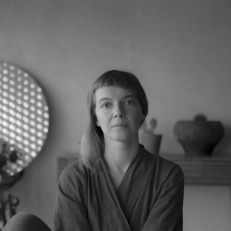
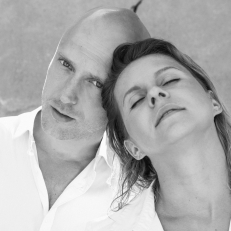
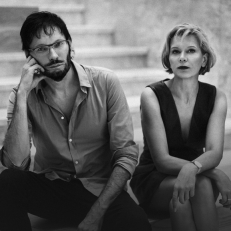
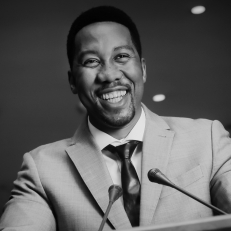

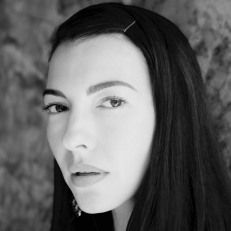

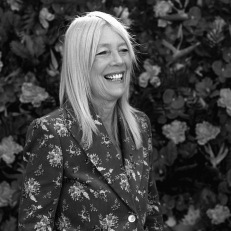
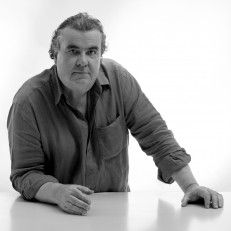


Add a comment